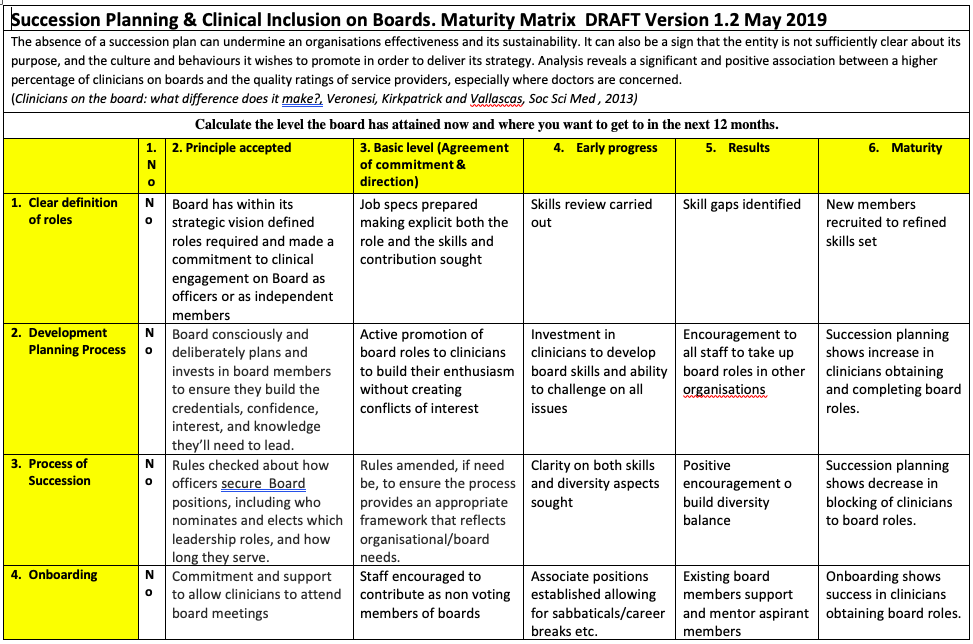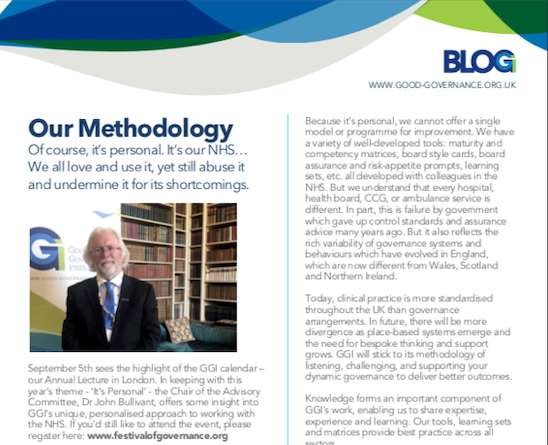Our Methodology
27 August 2019
Of course, it’s personal. It’s our NHS… We all love and use it, yet still abuse it and undermine it for its shortcomings.

September 5th sees the highlight of the GGI calendar – our Annual Lecture in London. In keeping with this year’s theme - ‘It’s Personal’ - the Chair of the Advisory Committee, Dr John Bullivant, offers some insight into GGI’s unique, personalised approach to working with the NHS. If you’d still like to attend the event, please register here: (include link to Festival Page)
In working with and for the NHS, we have a challenging role; we need to be supportive, encouraging and offer guidance and examples of better practice from elsewhere like the South African King reports. We need to be respectful of staff and the experience and commitment of members and volunteers whilst being prepared to scrutinise, challenge and expose static compliance or mediocre performance. We cannot condone wrong-doing, bullying or disguising the truth; but we can applaud diversity and genuine attempts to improve, even when they fail at first. We are not regulators, so Boards can trust us with their fears, concerns, lack of knowledge, or answers. And we can help to network these with common issues or learning.
This is our way of doing things at the Good Governance Institute. We enjoy what we do and, on the whole, the people that we work with. It’s personal; we have found many friends and we stick with them. We believe the Board is important and have spent the last ten or more years talking up the roles of the Board, the company secretary, the audit committee and the contribution of the Board of governors, patients and carers. Use them or lose them.

Because it’s personal, we cannot offer a single model or programme for improvement. We have a variety of well-developed tools: maturity and competency matrices, board style cards, board assurance and risk-appetite prompts, learning sets, etc. all developed with colleagues in the NHS. But we understand that every hospital, health board, CCG, or ambulance service is different. In part, this is failure by government which gave up control standards and assurance advice many years ago. But it also reflects the rich variability of governance systems and behaviours which have evolved in England, which are now different from Wales, Scotland and Northern Ireland.
Today, clinical practice is more standardised throughout the UK than governance arrangements. In future, there will be more divergence as place-based systems emerge and the need for bespoke thinking and support grows. GGI will stick to its methodology of listening, challenging, and supporting your dynamic governance to deliver better outcomes.
Knowledge forms an important component of GGI’s work, enabling us to share expertise, experience and learning. Our tools, learning sets and matrices provide best practice across all sectors.
Our guidance on Learning Sets
A Learning Set consists of a group of about six people who agree to meet together on a regular basis to discuss work-related issues or to develop skills in an area of common interest. Learning Sets give individuals time to explore issues that they need to resolve in an environment which is empowering and which helps the individual find a solution. Members can develop skills in listening, empathy, giving feedback, and a positive approach to challenge.
A Learning Set can consist of colleagues from a single organisation or from different sectors and different professional backgrounds.
GGI, its staff and associates have considerable experience in supporting, establishing and running Learning Sets. Here we share some basic advice and ground rules:
- clarify purpose
- establish an etiquette
- meet differently
- do not limit membership to same as you
- you only need 6 friends who will always take your call rather than a network of hundreds
- make a shared commitment to real action and change
- become mentors to each other – learning with and through each other
- expect to ask questions, seek answers, gain support and expect challenge
- be positive and open-minded about issues/problems being discussed and possible solutions
- learn by doing: work on real problems and implement solutions
- agree all discussions are confidential to the group
- consider a facilitator to help shape the work of the group. They ensure that the ground-rules are followed and that the learning is clarified. Initially, they may intervene a lot but less as the group grows in confidence and competence. Over time, a group may become self-facilitating
- invite colleagues with the same jobs from different sectors to review their roles, influence and how they fit into the organisational hierarchy.
Our Maturity Matrices
Our best practice matrices cover all sectors from health and education to federations and collaborative working. GGI’s matrices can help your organisation both review and develop its internal governance as well as provide the benchmark for internal performance measuring purposes.
Our knowledge resources are free to download online at our website: www.good-governance.org.uk/knowledge.

